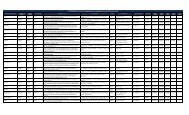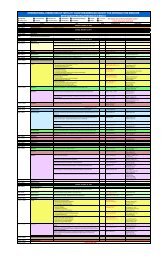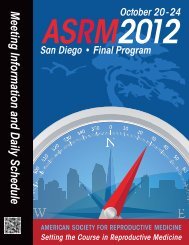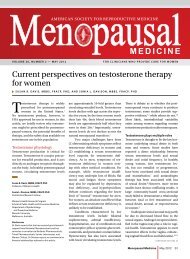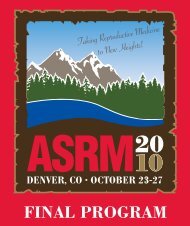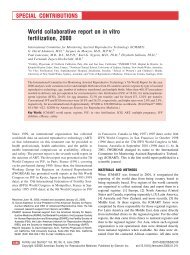scientific program • symposia - American Society for Reproductive ...
scientific program • symposia - American Society for Reproductive ...
scientific program • symposia - American Society for Reproductive ...
Create successful ePaper yourself
Turn your PDF publications into a flip-book with our unique Google optimized e-Paper software.
44 TH ANNUAL POSTGRADUATE PROGRAM<br />
NEEDS ASSESSMENT AND COURSE DESCRIPTION<br />
The requirement of suturing at laparotomy <strong>for</strong> reproductive surgery is self evident, but this is the main deterrent to<br />
per<strong>for</strong>ming reproductive surgery by laparoscopy; in fact, inability to suture via laparoscopy is a deficiency in ALL branches<br />
of laparoscopic surgery – whether urology or general surgery. This deficit has been the main driver of robotic laparoscopic<br />
surgery as an expensive enabler.<br />
This course has been designed <strong>for</strong> reproductive surgeons who would like to advance their laparoscopic skills by being<br />
able to confidently per<strong>for</strong>m laparoscopic suturing. The progressive algorithm <strong>for</strong> laparoscopic suturing presented in this<br />
course has been tested nationally and internationally over many years and results in proficiency with intracorporeal knotting<br />
in less than three minutes by more than 80% of attendees. The methodology employed and relative hand positions and<br />
movements are immediately transferable from the trainer to the OR. The course equips all attendees with improved suturing<br />
skills and insights into their application during surgery. In addition to single stitch placement, continuous suturing, and<br />
microsuturing will be covered, enabling the participants to use these skills to per<strong>for</strong>m laparoscopic myomectomy as well<br />
as tubal reconstructive surgery. Didactic lectures will improve participants’ knowledge, and the hands-on component will<br />
provide direct clinical skills improvement.<br />
LEARNING OBJECTIVES<br />
After participating in this course, participants should be able to:<br />
1. Explain the ergonomics, theory, and rational <strong>for</strong> reproducible laparoscopic suturing.<br />
2. Apply skills learned to relevant reproductive surgery including myomectomy and tubal surgery.<br />
3. Apply skills acquired to management of bowel, bladder, and ureteral complications by appropriate suture repair.<br />
4. Demonstrate measurable improvement in laparoscopic suturing skills.<br />
________________________________________________________________________________________________________________________<br />
CAP COURSE<br />
REPRODUCTIVE LABORATORY ACCREDITATION PROGRAM INSPECTOR TRAINING SEMINAR<br />
Course PG23 (Sunday) <strong>•</strong> PEABODY BAY HILL 21-22<br />
To register <strong>for</strong> this course, please contact the CAP Education Division at 800-323-4040 ext. 7525 or education@cap.org.<br />
FACULTY<br />
Erica J Behnke Ph.D., H.C.L.D.<br />
Kettering Med Center<br />
CAP STAFF<br />
Lyn Wielgos, MT(ASCP)<br />
Technical Specialist, CAP Laboratory Accreditation Program<br />
NEEDS ASSESSMENT AND COURSE DESCRIPTION<br />
In collaboration with ASRM, the College of <strong>American</strong> Pathologists (CAP) has developed an accreditation <strong>program</strong><br />
specifically designed <strong>for</strong> the unique needs of reproductive laboratories. This <strong>program</strong> was created with the primary<br />
objective of improving the quality of laboratory services through voluntary participation, professional peer review,<br />
education and compliance with established per<strong>for</strong>mance standards. Due to recent changes in accreditation inspection<br />
requirements, additional laboratorians may be involved in the inspection process.<br />
Experience has shown that laboratorians already possess the technical knowledge regarding good laboratory practices.<br />
The purpose of this seminar is to demonstrate effective inspecting techniques so that inspectors will be more confident<br />
and com<strong>for</strong>table per<strong>for</strong>ming inspection. The morning sessions focus on the overall inspection process including team<br />
preparation, resources and practical “how to” tips of conducting the inspection. The afternoon consists of sessions<br />
highlighting the accreditation requirements unique to embryology, andrology and cryobiology testing. Sessions include<br />
PowerPoint presentations, small and large group discussions regarding inspection scenarios, and hands-on document<br />
reviews. This seminar fulfills both the team leader and team member training requirements.<br />
LEARNING OBJECTIVES<br />
At the completion of this seminar, the participant will be able to:<br />
1. Prepare and per<strong>for</strong>m an inspection using CAP resources.<br />
2. Use generally accepted techniques to produce consistent inspection findings.<br />
3. Identify deficiencies and recommendations and appropriately document findings.<br />
4. Identify compliance requirements unique to embryology, andrology, and cryobiology.<br />
________________________________________________________________________________________________________________________<br />
55



